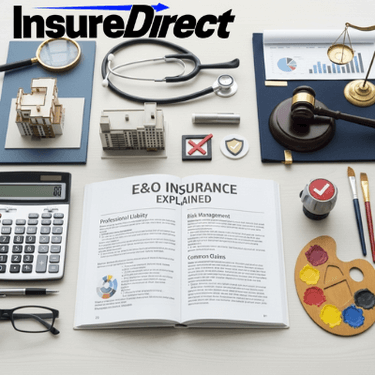When I first heard about “E&O insurance,” honestly, I didn’t even know what that meant. Someone told me it was like a safety net if I messed up with clients, but I shrugged it off. A mistake, let me tell you, because later on, I realized real quick that financial advising without protection is like driving without seatbelts—maybe fine until the one day it isn’t.
So, what is this thing anyway? Errors and Omissions insurance (that’s the full name, though people call it E&O to sound fancy) basically shields advisors like me from lawsuits when clients claim we screwed up. Maybe you didn’t disclose something, or maybe they think you didn’t. Could be negligence, could be bad communication, could be “you didn’t tell me my retirement fund could tank.” The truth is, you can be careful every step and still end up in court.
I’ll explain in plain talk: E&O covers legal defense, settlements, attorney bills, arbitration costs, all those ugly numbers that pile up even if you did nothing wrong. Crazy part? You could act totally in good faith, but once a client feels burned, boom—they sue.
Why I (and you) Need This Insurance
Look, I’ve been around long enough to see the stories. Financial advisors—good ones—losing everything from a single angry client. It’s not fair, but the world’s not fair, is it? Here’s why I finally got my coverage:
First, lawsuits. They are expensive. Forget what you’ve seen in movies, in reality just hiring an attorney drains your savings.
Second thing, credibility. Clients want to know I’m covered. If they see I take precautions, they trust me more.
Another point: compliance. Many broker-dealers straight-up require you to have E&O before they even let you sign contracts.
And honestly? Peace of mind. I sleep better at night, not staring at the ceiling wondering what happens if Mr. Johnson decides his 401k “lost value” because of me.
Coverage – What Does It Actually Do?
Okay, here’s the fun part. The insurance is pretty broad, but also not everything. Stuff it usually takes care of:
Negligence claims. “You gave me the wrong advice, I lost money.” Yeah, that.
Misrepresentation, even accidental. Maybe I forgot a detail in an investment risk.
Failure to act when I should have (client says, “Why didn’t you move my funds?”).
Defense fees—lawyers are not cheap, and this eats you alive without coverage.
Settlements and judgments if the court sides with the client.
So it’s not magic, but it’s solid.
What It Doesn’t Touch
I had to learn the exclusions part carefully, because that’s where advisors get tripped up. Few examples:
Fraud. If you straight-up lied, no insurance saves you.
Bodily injury/property stuff. That’s general liability, different policy.
Employment disputes—like harassment or discrimination, totally separate.
Guaranteed returns. You can’t promise profits, and insurance won’t back you if you did.
I guess the moral? Always read the fine print. Don’t just sign and assume.
How Much Do You Pay for This Thing?
This is the question I asked first: “What’s the damage?” Honestly, the range shocked me. Depends on your revenue, services, claim history, and limits. Advisors who play with high-risk stuff (hedge funds, private placements) usually pay more.
For me, it ended up between $1,500 and $3,000 per year depending on limits I picked. Some friends pay close to $5,000 annually. Still, compare that to $50,000 in legal bills from one lawsuit. Yeah, worth it.
Choosing the Right Policy (Lessons I Learned)
Here’s how I shopped around:
I figured out what limits I realistically needed (my book of business isn’t massive, but enough).
Checked exclusions line by line, because some policies sneak in tricky wording.
Got multiple quotes—don’t settle for the first shiny brochure.
Made sure it satisfies broker-dealer requirements. No point buying coverage that doesn’t “count.”
I used a broker who actually understands financial services, not just any agent. They explained what I didn’t even know to ask.
A Real Situation That Changed My Mind
Storytime. Few years ago, I had a client who lost money in mutual funds during a market downturn. Nothing unusual—markets swing. But the client swore I “never explained the risks properly.” She threatened to sue.
Even though she never followed through, I spent weeks sweating bullets imagining how I’d pay for defense costs. If she had gone to court? I’d be in the hole for tens of thousands, maybe more. That’s when I stopped messing around and bought E&O. Lesson learned.
Wrapping This All Up
End of the day, E&O insurance isn’t optional if you’re in financial advising. Not really. It protects your business, your savings, and frankly your sanity. Mistakes, misunderstandings, and market downturns—they all happen whether we like it or not.
If you’re advising people on money and don’t have this policy? Please reconsider. I was skeptical once, too. Now I wouldn’t operate a single day without it. Clients trust me more, I sleep easier, and I don’t live in fear of a lawsuit ruining my life.
If you’re looking for reliable insurance coverage, InsureDirect has you covered. Getting a home insurance quote is fast and simple. Visit our website or reach out to our corporate office:
InsureDirect.com
Corporate Home Office
618 South Broad Street
Lansdale, Pennsylvania 19446
Email: contact@insuredirect.com
Phone: (800) 807-0762 ext. 602
Protect your home and enjoy peace of mind with the trusted coverage from InsureDirect. Your home deserves the best—don’t settle for less.

